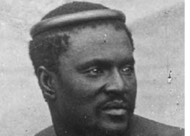Ibn Battta 1 On Flowvella
Ibn Battuta, a celebrated traveler, was born in Tangier, Morocco. He lived from 1304 to 1368/1369 and is renowned for his travelogue, Rihla, which simply means Travels. It recounts his many journeys throughout the Muslim world as well as far-flung regions like Russia, China and Constantinople. As Ibn Battuta traveled to the court in Delhi, 82 Hindu bandits attacked his group of 22; Ibn Battuta and his men drove them off, killing 13 of the thieves. King Tughluq appointed him judge of Delhi, but since Ibn Battuta did not speak Persian, the language of the court, two scholars were appointed to do the work of hearing cases. Ibn Battuta travels to Mesopotamia, Persia, Syria and Arabia 1. How do the beliefs and practices of Shi’a, Sunni and Sufi Muslims differ? Sunnis believe that Qur’anic revelation are to be interpreted by consensus of the community, not by the leader with special knowledge and wisdom.
Ibn Battuta in Egypt Author: Leon Benett How do we know about Ibn Battuta? When Ibn Battuta returned to near the end of his life in 1354, he told many tales of his fantastic journeys abroad. The ruler of Morocco wanted a record of Ibn Battuta's travels and insisted that he tell the stories of his journeys to a scholar. The scholar wrote the accounts down and they became a famous travel book known as the Rihla, which means 'Journey.'

Plants vs zombies 2 free online. Where did Ibn Battuta grow up? Ibn Battuta was born on February 25, 1304 in Tangier, Morocco. At this time, Morocco was part of the Islamic Empire and Ibn Battuta grew up in a Muslim family. He likely spent his youth studying at an Islamic school learning reading, writing, science, mathematics, and Islamic law. Hajj At the age of 21, Ibn Battuta decided it was time for him to make a pilgrimage to the Islamic holy city of Mecca. He knew that this would be a long and difficult journey, but he said goodbye to his family and set out on his own.
The trip to Mecca was thousands of miles long. He traveled across north Africa, usually joining a caravan for company and the safety of numbers. Along the way, he visited cities such as Tunis, Alexandria, Cairo, Damascus, and Jerusalem. Finally, a year and half after leaving home, he reached Mecca and completed his pilgrimage.
Travels Ibn Battuta discovered during his pilgrimage that he loved to travel. He liked seeing new places, experiencing different cultures, and meeting new people. He decided to continue traveling. Over the next 28 or so years, Ibn Battuta would travel the world. He first went up into Iraq and Persia visiting parts of the and cities such as Baghdad, Tabriz, and Mosul.
He then traveled along the east coast of Africa spending time in Somalia and Tanzania. After seeing much of the African coast, he returned to Mecca for Hajj. Ibn Battuta next headed north visiting the land of Anatolia (Turkey) and the Crimean peninsula. He visited the city of Constantinople and then began to head east to India.
Ibn Battuta 1 On Flowvella Review
Once in India, he went to work for the Sultan of Delhi as a judge. He left there after a few years and continued his travels to China. In 1345, he arrived in Quanzhou, China. While in China, Ibn Battuta visited cities such as Beijing, Hangzhou, and Guangzhou. He traveled on the, visited the, and met with the Mongol Khan who ruled China. After spending over a year in China, Ibn Battuta decided to head home to Morocco.
Ibn Battuta 1 On Flowvella Logo
He had almost reached home when a messenger informed him that his parents had died while he was away. Rather than return home, he continued on his travels. He went north to Al-Andalus (Islamic Spain) and then headed back south into the heart of Africa to visit and the famous African city of Timbuktu. Later Life and Death In 1354, Ibn Battuta finally returned to Morocco.
He told the story of his adventures to a scholar who wrote it all down in a book called the Rihla. Add avi files to avi to mp4 converter for mac. He then remained in Morocco and worked as a judge until he died around the year 1369.